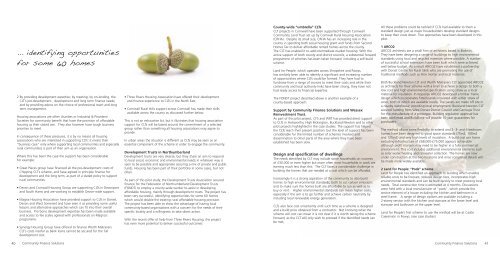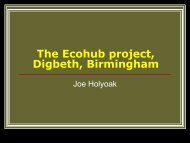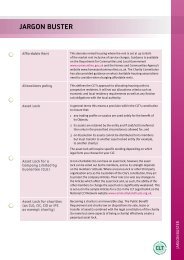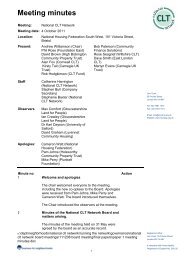Then we will do it ourselves - Community Land Trusts
Then we will do it ourselves - Community Land Trusts
Then we will do it ourselves - Community Land Trusts
Create successful ePaper yourself
Turn your PDF publications into a flip-book with our unique Google optimized e-Paper software.
... identifying opportun<strong>it</strong>iesfor some 60 homes2 By providing development expertise; by meeting, by on-lending, theCLT’s pre-development , development and long term finance needs;and by providing advice on the choice of professional team and longterm management.Housing associations are often char<strong>it</strong>ies or Industrial & ProvidentSocieties for commun<strong>it</strong>y benef<strong>it</strong> that have the provision of affordablehousing as their stated aim. They also ho<strong>we</strong>ver have tough businessprior<strong>it</strong>ies to meet.In consequence of these pressures, <strong>it</strong> is by no means all housingassociations who are interested in supporting CLTs: <strong>it</strong> meets their“business case” only where supporting local commun<strong>it</strong>ies and especiallyrural commun<strong>it</strong>ies is part of their aim as an organisation.Where this has been the case the support has been considerable.For example:• Great Places group have financed all the pre-development costs ofChipping CLT’s scheme, and have agreed in principle finance fordevelopment and the long term, as part of a stated policy to supportrural commun<strong>it</strong>ies.• Devon and Cornwall Housing Group are supporting CLTs in Devonportand South Hams and are working to establish Devon-wide support.• Magna Housing Association have provided support to CLTs in Dorset,Devon and West Somerset and have seen <strong>it</strong> as providing some usefullessons and alternative approaches which can f<strong>it</strong> into their overallbusiness. Pro bono development expertise has been made availableand access to fee scales agreed w<strong>it</strong>h professionals on Magna’sprogramme.• Synergy Housing Group have offered to finance Worth MatraversCLT’s costs insofar as bank loans cannot be secured for the fulldevelopment cost.• Three Rivers Housing Association have offered their developmentand finance experience to CLTs in the North East.• Cornwall Rural HA’s support across Cornwall has made their skillsavailable across the county as discussed further below.This is not an exhaustive list, but <strong>it</strong> illustrates that housing associationsupport for CLTs <strong>will</strong> be based around the comm<strong>it</strong>ment of a selectedgroup rather than something all housing associations may aspire toprovide.In urban areas the s<strong>it</strong>uation is different as CLTs may be seen as anessential component of the scheme in order to engage the commun<strong>it</strong>y.Development <strong>Trusts</strong> in NorthumberlandDevelopment trusts are very diverse, but they share an aim to respondto local social, economic and environmental needs in whatever way isseen to be possible and appropriate securing a mix of private and publicfunds. Housing has been part of their portfolio in some cases, but notoften.As part of this pilot study, the Development <strong>Trusts</strong> Association securedfinance for the Federation of Northumberland Development <strong>Trusts</strong>(FONDT) to employ a county-wide worker to assist in developingaffordable housing, mainly through development trusts. The project hasbeen very successful, identifying opportun<strong>it</strong>ies for some 60 homeswhich would <strong>do</strong>uble the existing rural affordable housing provision.The project has been able to show the advantage of having localcommun<strong>it</strong>y-based organisations w<strong>it</strong>h a concern for the needs of theirspecific local<strong>it</strong>y and a <strong>will</strong>ingness to take direct action.W<strong>it</strong>h the recent offer of help from Three Rivers Housing, the projecthas even more potential to deliver successful outcomes.County-wide “umbrella” CLTsCLT projects in Cornwall have been supported through CornwallCommun<strong>it</strong>y <strong>Land</strong> Trust set up by Cornwall Rural Housing Association(CRHA). Desp<strong>it</strong>e <strong>it</strong>s small size, CRHA has an increasing role in thecounty in spending both social housing grant and funds from SecondHomes Tax to deliver affordable rented homes across the county.The CLT has enabled <strong>it</strong> to add intermediate market housing. W<strong>it</strong>h theactive support of both county and district councils, a substantial forwardprogramme of schemes has been taken forward, including a self-buildscheme.<strong>Land</strong> for People, which operates across Shropshire and Powys,has similarly been able to identify a significant and increasing numberof opportun<strong>it</strong>ies where CLTs could be formed. They have had tofundraise from a range of sources to meet their costs and while theircommun<strong>it</strong>y and local author<strong>it</strong>y links have been strong, they have nothad ready access to financial expertise.The FONDT project described above is another example of acounty-based approach.Support by Commun<strong>it</strong>y Finance Solutions and WessexReinvestment Trust.As part of this pilot project, CFS and WRT has provided direct supportto CLTs in Holsworthy, High Bickington, Buckland Newton and to otherpilot projects highlighted in the case studies. The support has helpedthe CLTs reach their present pos<strong>it</strong>ion: but the level of support has beenconsiderable for the lim<strong>it</strong>ed number of schemes involved anddissemination to other parts of the area where they have beenestablished has been slow.Design and specification of d<strong>we</strong>llingsThe needs identified by CLT may include some households on incomesof £30,000 or even higher but more often most households in work areearning much less than this. The CLT faces a considerable challenge inbuilding the homes that are needed at a cost which can be afforded.Increasingly <strong>it</strong> is a strong aspiration of the commun<strong>it</strong>y to also buildhomes to high environmental standards, both to cut carbon emissionsand to make sure the homes built are affordable to run as <strong>we</strong>ll as tobuy or rent. Higher environmental standards can mean higher costs,especially if the aim is to go further and achieve carbon neutral<strong>it</strong>y byincluding local renewable energy generation.CLTs also face cost uncertainty until such time as a scheme is designedand a build price obtained from a contractor. Not knowing what thescheme <strong>will</strong> cost can mean <strong>it</strong> is not clear if <strong>it</strong> is worth taking the schemeforward, as the CLT <strong>will</strong> only wish to proceed if the identified needs canbe met,.All these problems could be tackled if CLTs had available to them astandard design just as major housebuilders develop standard designsto keep their costs <strong>do</strong>wn. Two approaches have been developed in thispilot.1 ARCO2ARCO2 arch<strong>it</strong>ects are a small firm of arch<strong>it</strong>ects based in Bodmin.They have been designing a range of buildings to high environmentalstandards using local and recycled materials where possible. A numberof successful school extensions have been built which <strong>we</strong>re achieved<strong>we</strong>ll below budget. As a result ARCO2 have established a partnershipw<strong>it</strong>h Dorset Centre for Rural Skills who are promoting the use oftrad<strong>it</strong>ional methods such as lime mortar and local materials.Both Buckland Newton CLT and Worth Matravers CLT appointed ARCO2as arch<strong>it</strong>ects for their scheme w<strong>it</strong>h a brief to achieve a design to both alow cost and high environmental specification using straw as a localmaterial for insulation. In response ARCO2 developed a timber framedesign which incorporates f<strong>it</strong>ted panels insulated w<strong>it</strong>h e<strong>it</strong>her straw ofwool, both of which are available locally. The panels are made off s<strong>it</strong>e ina nearby warehouse, providing local employment. Buckland Newton CLTsecured funding from West Dorset District Council and Carnegie Trustfor the manufacture of a prototype. Building regulation approval hasbeen confirmed and BuildZone <strong>will</strong> provide 10 year guarantees forpurchasers.The method allows some flexibil<strong>it</strong>y to extend and 2- 3- and 4-bedroomhomes have been designed to good space standards (75m2, 100m2and 125m2) and very high levels of insulation. A build cost per homeexcluding infrastructure of £68,000-£75,000 appears achievablealthough prof<strong>it</strong> margins may need to be higher in a fully commercialenvironment. This cost includes add<strong>it</strong>ional environmental elements suchas solar water heating and rainwater collection. The homes are nowunder construction at the two locations and once completed details <strong>will</strong>be made more widely available.2 <strong>Land</strong> for People: “Pods” scheme<strong>Land</strong> for People has identified an approach to building which enablesreliable costs to be forecast, reduces design fees, incorporates highenvironmental standards and can be built quickly to meet pressing localneeds. Total construction time is estimated at 4 months. Discussions<strong>we</strong>re held w<strong>it</strong>h a local manufacturer of “pods”, which provide theservice element of a house including the k<strong>it</strong>chen and bathroom in asteel frame. A range of design options are available including a2-storey version w<strong>it</strong>h the k<strong>it</strong>chen and staircase at the lo<strong>we</strong>r level andstaircase and bathroom at the upper level.<strong>Land</strong> for People’s first scheme to use the method <strong>will</strong> be at CastleCaereinion in Powys. (see case studies)Commun<strong>it</strong>y Finance Solutions40 Commun<strong>it</strong>y Finance Solutions 41






